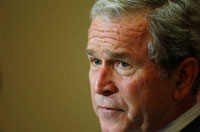Bush: A lot of people are watching
President George W. Bush and congressional backers of a $700 billion U.S. financial industry bailout carried out high-intensity lobbying Thursday, on the eve of a crucial House of Representatives vote that Bush said "a lot of people are watching."

Bush resumed his plea for passage from the White House as both Democratic and Republican party leaders worked the offices and halls of congressional office buildings. The goal: secure enough votes to send Bush a bill that he said presents the "best chance" to combat the widening credit crunch.
Speaking to reporters during a meeting with business executives, Bush said the increasingly tight credit markets are in some instances threatening the existence of small businesses. He said Congress "must listen" to those arguing for passage of the bill, derided by many in Congress and within the general American public as a handout to a risk-taking Wall Street.
The much-maligned measure was returned to the House after the Senate resuscitated it with tax cuts and other sweeteners in a 74-25 vote late Wednesday. The bill had been defeated in House narrowly on Monday.
The fierce lobbying came as the head of the Federal Deposit Insurance Corporation, urged people to remain calm.
"I think overall the banking system remains very sound so that's why I think it's so important for everybody to keep their head," commission Chairman Sheila Bair said on C-SPAN. "What I don't want is to see otherwise healthy institutions start to get into trouble just because of liquidity pressure ... Wall Street should be taking their cue from Main Street right now. Main Street deposits are staying there."
But the drumbeat of bad news rattled on. A government report said that orders to U.S. factories plunged by the largest amount in nearly two years as the credit strains smashed manufacturers with hurricane-like force.
Stocks declined on Wall Street early Thursday after the number of people seeking unemployment benefits rose last week to a seven-year high. The Dow Jones industrials fell by about 135 points, their fourth straight triple-digit move.
Bush said the issue is affecting employees and families across the U.S. and that lawmakers "must listen" so confidence can be restored in markets and financial institutions.
Financial markets around the world were also waiting the measure's approval, hoping it would inject confidence and prevent a global economic slowdown.
The bailout package was never in danger in the Senate. Lawmakers there played catalysts for the House instead, adding tax provisions popular with the left and right in a bid that House leaders hope _ but cannot guarantee _ will persuade enough of the House rank-and-file to switch from "nay" to "aye" on a highly contentious bill a month before Election Day.
They were especially targeting the 133 House Republicans who voted against the package.
Rep. David Dreier, a Repyublican, said Thursday he will vote for the bill, as he did Monday, despite some misgivings.
"I will tell you, the American people are angry and frustrated," he said on ABC television's "Good Morning America," saying he's been hearing messages like "the woman who said she was concerned about getting access to a student loan for her daughter."
Rep. Marcy Kaptur, a Democrat, said on the same program that she plans to vote no.
"I will not support this legislation because it's the wrong medicine," she said. Kaptur argued that the problem should be solved by the market itself, not through governmental intervention.
After the Senate vote, Majority Leader Harry Reid, a Democrat, said, "We've sent a clear message to Americans all over that we will not let this economy fail. This is not a piece of legislation for lower Manhattan. This is legislation for all America."
The rescue package would let the government spend billions of dollars to buy bad mortgage-related securities and other devalued assets held by troubled financial institutions. If successful, advocates say, that would allow frozen credit to begin flowing again and prevent a serious recession.
To some degree, at least, House Republican opposition appeared to be easing as the Senate added $100 billion in tax breaks for businesses and the middle class, plus a provision to raise, from $100,000 to $250,000, the cap on federal deposit insurance.
House Republicans also welcomed a decision Tuesday by the Securities and Exchange Commission to ease rules that force companies to devalue assets on their balance sheets to reflect the price they can get on the market.
There were worries, though, that the tax breaks might cause some conservative-leaning Democrats who voted for the rescue Monday to abandon it because the revised version would swell the federal deficit.
"I'm concerned about that," said Rep. Steny Hoyer, the Democratic leader.
The Senate vote lacked the drama of Monday's House vote, but it had its celebrity moments. Democratic presidential nominee Barack Obama and his Republican rival, John McCain, came off the campaign trail to vote for the package, thrilling tourists who glimpsed them in the Capitol building's corridors and drawing hordes of reporters and photographers
Subscribe to Pravda.Ru Telegram channel, Facebook, RSS!


